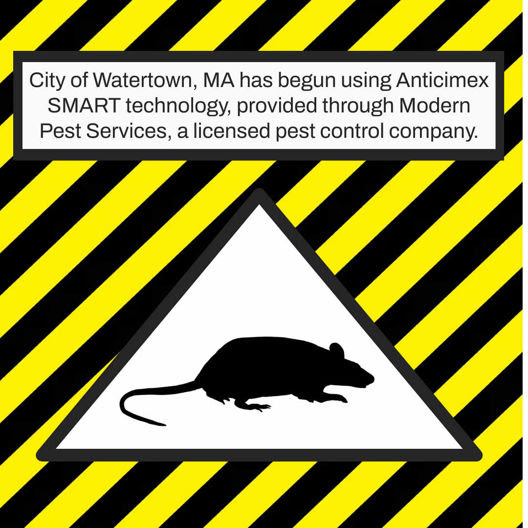
With the problem of rodents growing around Watertown, and more expected as a result of a pair of major road projects, the Department of Public Works will deploy more robust rodent control methods.
The City will use dozens of smart traps that will both take care of rats and other rodents, and also provide information such as where the “hot spots” are, said Tom Watkins, Director of Administration and Finance for the Watertown DPW.
“The Anticimix technology does represent a change in the way we are approaching our efforts in addressing rodent control in the City,” Watkins said. “The Anticimix is a SMART technology that provides us real live data for which we will use to strategically locate the traps as the program moves forward.”
The City, in partnership with Modern Pest Services, will deploy 40 of the traps on Arsenal Street and 30 on Mt. Auburn Street and 10 more in other areas of the city, such as near public dumpsters, Watkins said. The city will also continue to use the same bait stations (the black boxes that can be seen around town).
“Over the next few months, we will be evaluating the data from both systems to determine effectiveness of each, and will also be taking into consideration costs of each system,” said Watkins, who noted that the Anticimix system has a significantly higher cost.
Anticimix describes its SMART traps as an intelligent, non-toxic, always-on solution for pest control, and was developed to provide municipalities and community organizations access to a comprehensive solution to rodent control. It uses Terad3 rodenticide.
“The Terad3 poison is much less detrimental to the avian population and we have had this type of poison put in all the regular bait stations (small black boxes) that have been deployed in the City from the DPW,” Watkins said.
The discussion of rodent control will continue at the Council’s Committee on Human Services meeting on Thursday, March 23 at 6:30 p.m. in City Hall and remote. See the agenda here. The meeting will be shown on Watertown Cable Access, to view it online click here.
Read the Mount Auburn Street Construction Pest Control FAQ: https://watertown-ma.gov/1011/Mount-Auburn-Street-Construction-Pest-Co
Read about Modern Pest’s SMART Cities: https://www.modernpest.com/blog/the-buzz-on-modern-pests-smart-cities
Well it is about time. I remember back when construction started and rats invaded our Watertown streets. We were told that it is the home owners problem to control the rat problem near our homes so they would not migrate into our homes. Watertown made it clear that they would not do anything.
Well I hired a company that deal with the rat problem. I have 5 black boxes around my house. The company maintains these boxes for a hefty fee. But I do not want a rat problem in my house. So I had to pay to keep the rats away.
Now Watertown has decided to help with the problem.
Watertown would not have had this problem if they did not allow all this construction. The town of Watertown was a nice peaceful neighborhood. Now it is a city, with large buildings and a major rat problem.
As a life time resident of the city of Watertown, I am very disappointed in my hometown.
There is no doubt that rodents and specifically the exploding rat population needs to be brought under control. In the above article Mr. Watkins stated that the City will, and understandably so, be evaluating both City selected rodent control options. He specifically noted cost will be part of that evaluation. It is already known that the SMART system is considerably more expensive than poison infused baits. One reason for the increased cost is that the SMART system provides important information that simple rodent bait traps do not. I hope and expect another key factor to be remembered about the SMART system during the evaluation is that while it costs more it has no negative impacts on avian predators, e.g. owls and hawks, that routinely consume rodents, including rats, as part of their daily diet. The other chemical option is a rodenticide which can and has the sure potential to negatively affect avian predators. These extremely important and beneficial natural avian predators cannot and do not have any means to avoid consuming rodenticide contaminated prey. We all have a responsibility to protect these beneficial avian predators and this responsibility has a cost.